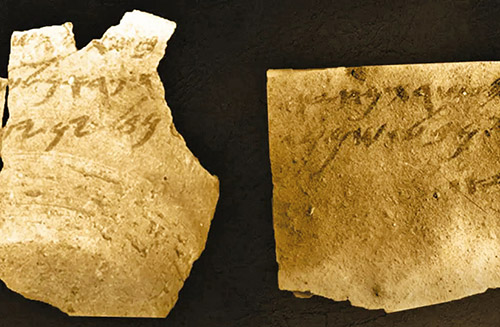
Part 1
When did the Jewish practice of naming children after someone begin?
The practice seems to have been instituted in Judea sometime after the destruction of the Second Temple (or possibly during the end of the First Commonwealth). Before that period, children were generally named after a significant event or occurrence in the life of the parent (e.g., Moses giving his son the Hebrew name Gershom—ger: stranger, sham: there—to signify his sojourn in a foreign land).
In Genesis Rabbah 37:7 we see:
“Rabbi Shimon ben Gamaliel said, the first ones were endowed with Divine inspiration; therefore they named their children after an event. However, we who do not possess that quality, we name after our ancestors.”
While classical personages from Tanach remain unique in the sense that nobody named their children after them, I have noticed one early case in Tanach where someone was named after a dead ancestor, albeit with a slight variation: one of Cain’s descendants was apparently named after him, namely Tuval Cain, thus indicating that the practice of naming sons after dead ancestors and relatives may be much older than previously thought.
Here’s another example: David named one of his daughters Tamar, quite possibly after the female progenitor of the kingdom of David (i.e., the wife of Judah).
While, as mentioned, the names of the three patriarchs are not repeated anywhere in Tanach, some of the names of the 12 sons of Jacob are. Here’s a partial list that I found of interest:
There is a Bohan, son of Reuben, in Joshua 15; a Shimon in Ezra 10; there are four Judahs in Nehemiah and one in Ezra; there is a Isaachar, son of Oved Edom, in Chronicles I, 26; a prophet named Gad mentioned in Samuel and Chronicles; a Yigal, son of Joseph, mentioned in Numbers 13; a, Asaf, son of Joseph, mentioned in Chronicles I, 25; and two more Josephs: one in Ezra and one in Nehemiah, respectively. The name Yoel appears 11 times throughout Tanach. (I am always incredulous when people say that the name Yoel is in any way uncommon or unique. It is in fact the third most common name in Tanach preceded by Zachariah and Meshulam—which are interchangeable names according to the Talmud.)
Notice that quite a few of them are from the period of Ezra and Nehemiah, i.e., Second Temple.
The Name Menashe/Manasseh
A name that is of great interest to me—and relevant to the recent Torah portion—is Menashe/Manasseh. In Genesis 41, Joseph’s wife Osnat, daughter of Potiphera, gives birth to two sons. Joseph is said to have named the firstborn Menashe (etymologically derived from the Hebrew word “nasha,” which means to forget, and it was commemorating the fact that Joseph “forgot his troubles”), and the younger one he named Ephraim (etymologically derived from the Hebrew word “poriah,” which means to be fruitful).
However, at least one of these names can also mean something else in the Egyptian language.
One wonders at the outset why Joseph would have “burdened” his children with such explicit Hebrew names. Why would he want to remind them of his foreign origins (Joseph himself, incidentally, was known by his Egyptian name Tzafnat Paneach)?
Let us take a look at a similar example of a name whose etymological root is given as Hebrew but also has a meaning in Egyptian, namely Moshe/Moses. In Exodus 10, he is said to have been named Moses by the daughter of Pharaoh, “ki min hamyaim meshitihu,” literally because he was pulled from the water. The obvious problem with this explanation is how could Pharaoh’s daughter have known the Hebrew language? And even if she did, why would she give him a Hebrew name? An additional problem lies in the fact that we don’t see the word masha (as in pulling) anywhere else in Tanach (other than one obscure passage in Psalms 17: yamsheini mimayim rabim).
Strong’s Concordance gives the name Moses as from the Egyptian mes ses.
In Egyptian, the name Moses means mes (birth) ses (protect), so named by Pharaoh’s daughter after she had pulled the infant from the banks of the river. (Shemot Rabbah 1:26, Chasidah p.345) Further, Moses led the Israelites across the Red Sea, which also shows deliverance out of water. Josephus also cites this etymology.
Some medieval Jewish scholars like the great Abraham Ibn Ezra suggested that Moses’ actual name was the Egyptian translation of “to draw out,” and that it was translated into Hebrew, either by the Bible or by Moses himself later in his lifetime.
Some modern scholars had suggested that the daughter of Pharaoh might have derived his name from the Egyptian name element mose, which means son, formed of or has provided. As a famous example, Thutmose means son of Thoth, and Rameses means Ra has provided (a son).
Interestingly, according to Islamic tradition, his name, Mūsā, is derived from two Egyptian words: Mū, which means water, and shā, meaning tree (or reeds), in reference to the fact that the basket in which the infant Moses floated came to rest by trees close to Pharaoh’s residence.
Manasseh in Egyptian
Thomas Kelly Cheyne and John Sutherland Black in Encyclopædia Biblica, similarly cite the possibility that the name Manasseh is derived from Menes, a common Egyptian name (Menes is considered to be the first king of a unified Egypt). Thus Manasseh would have had the convenience of having a kosher Hebrew name that happened to also have a meaning in the Egyptian language.
Manasseh, King of Judah
Now let us for a minute turn to a different Manasseh, not Joseph’s son but rather the son of Hezekiah, king of Judah (687-642 BCE). Although he reigned for quite a long time, relatively little information is revealed about him in Tanach. What is clearly apparent from the biblical account, however, is that he was a wicked idolater.
What struck me most about him is the fact that the name Manasseh is a pretty unique name in Tanach. The question is why did Menashe’s righteous father Hezekiah give his son this name? Was it to commemorate forgetting something (as in the case of Joseph) or was it something more significant?
In order to attempt to answer this question, let us take a look for a moment at the Talmud in Brachot 10a. The Talmud relates that Isaiah the Prophet went to tell Hezekiah that he was going to die (the narrative of Hezekiah’s sickness and miraculous recovery is found in 2 Kings 20:1, 2 Chronicles 32:24, and Isaiah 38:1) because he [Hezekiah] deliberately did not sire any progeny. This was on account of the fact that Hezekiah had seen prophetically that his child would be a prolific idolator and therefore he preferred not to have children.
The Prophet Isaiah told him that he was required to fulfill the biblical commandment of “be fruitful and multiply” and not outguess God about what the future would bring. Isaiah then suggested perhaps if his own daughter married Hezekiah, in the merit of righteous parents their children would also be righteous. Hezekiah agreed and Isaiah’s daughter bore him Manasseh who was an idolator (and later murdered his own grandfather Isaiah).
Forgive me if this sounds overly casuistic, but a thought struck me when I read that. Perhaps, as Hezekiah shuddered to bring a child into a world awash in idol worship, he thought back to a time when another Hebrew monarch, at a different time and place, was faced with a similar dilemma. Joseph in Egypt, living in a land full of idol worship, surely had second thoughts about having children. Yet he did have children and not only did they not grow up to become idol worshippers, but they have since become the prototype of “good children.” To this day, fathers bless their sons with the blessing that the patriarch Jacob gave to the sons of Joseph יְשִׂמְךָ אֱלֹקים כְּאֶפְרַיִם וְכִמְנַשֶּׁה, “May God make you like Efraim and Menashe” (Genesis 48). Perhaps Hezekiah seized upon the name as a sort of segula, lucky charm, that his son may turn out righteous after all. And in fact, we see (in 2 Chr. 33:11-13) that Manasseh did repent during the end of his life. There is even an apocryphal book called “The Prayer of Manasseh” that commemorates this event.
The Prophet Isaiah’s martyrdom at the hands of Menasseh is referred to in both ancient Jewish and Christian texts. In addition to the account in Brachot, it is also mentioned in a Christian apocryphal work called “Lives of the Prophets” and in “The Martyrdom of Isaiah,” which has been preserved in part in the Christian work “The Ascension of Isaiah.”
I also came across an interesting verse in Judges 18 that seems to link Moses and Manasseh. There we find mention of a priest, closely associated with an idol worshipping cult called “pesel micha.” His name is given as Yehonatan ben Gershom ben Menashe. However, the “נ” in Menashe is superscripted, which does not occur elsewhere in the Tanach. The correct reading is probably ben Moshe and Rashi and other sages suspected as much, arguing that the name was changed to Manasseh in order to avoid embarrassing Yehonatan’s grandfather Moses. So here again we have illustrious ancestors and wayward idol-worshipping children. I would also add that Moshe, like Menashe [the first], is raised in the king’s palace in an atmosphere permeated with idol worship. Yet he too, like Menashe, is steadfast in his monotheism.
The author is an independent researcher of Jewish history and culture. He is also a freelance translator of Hebrew text. He can be reached at yoelswe@gmail.com.











